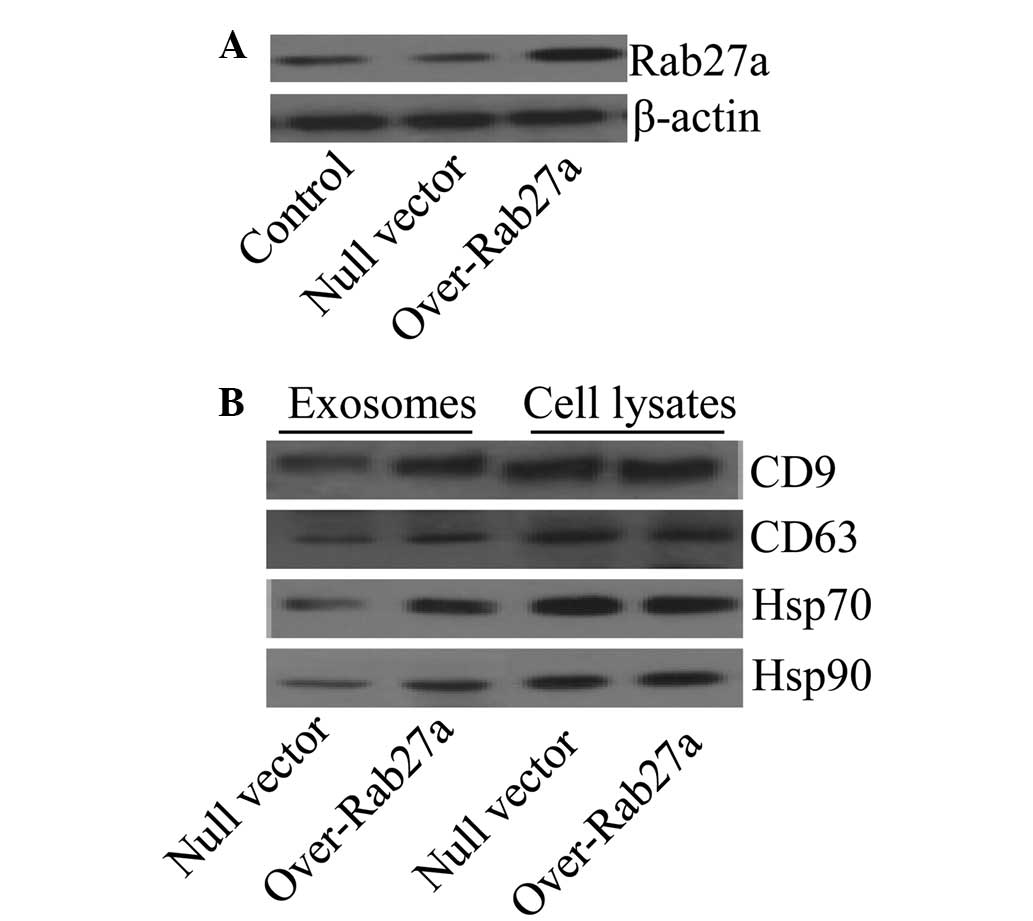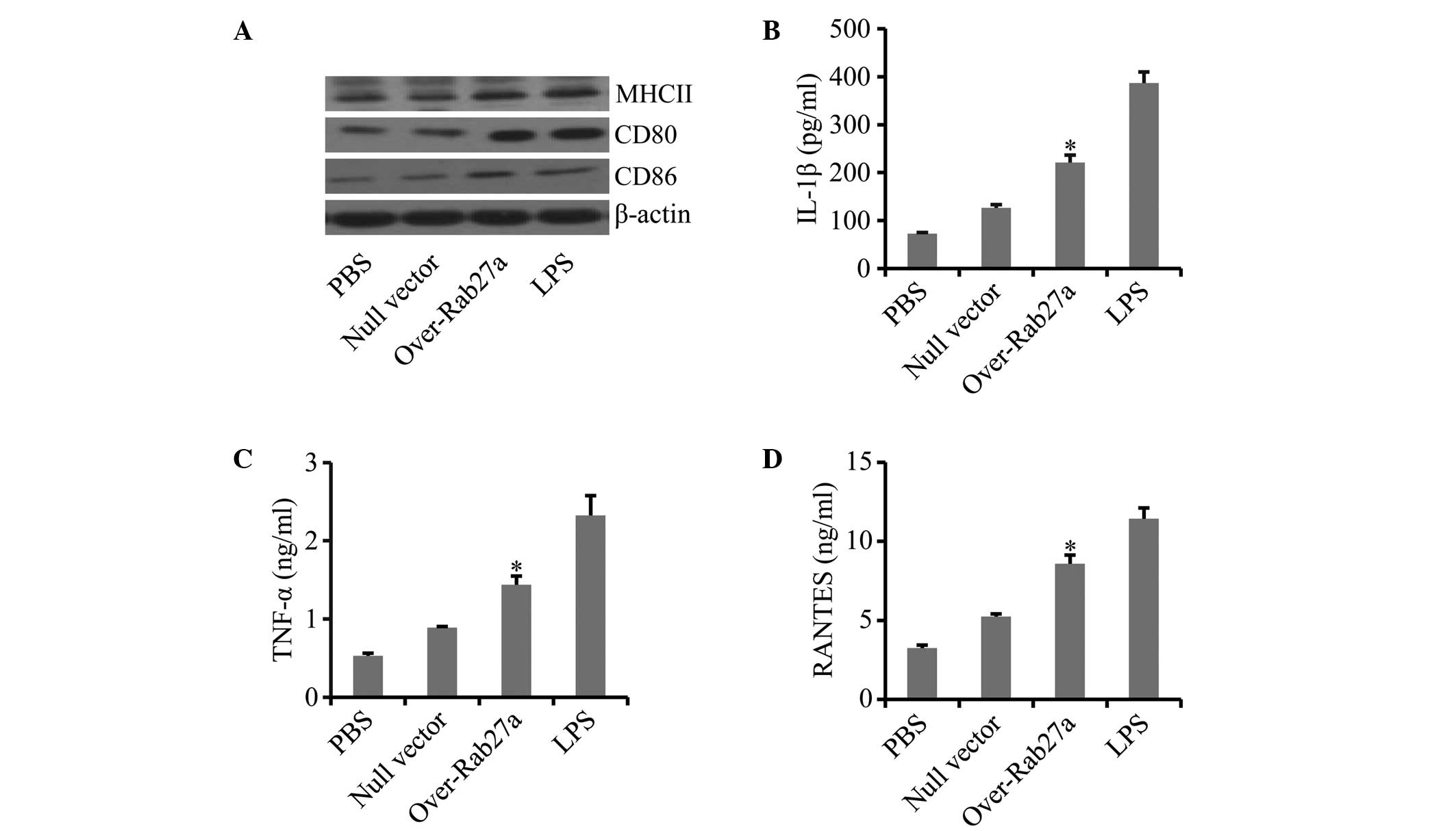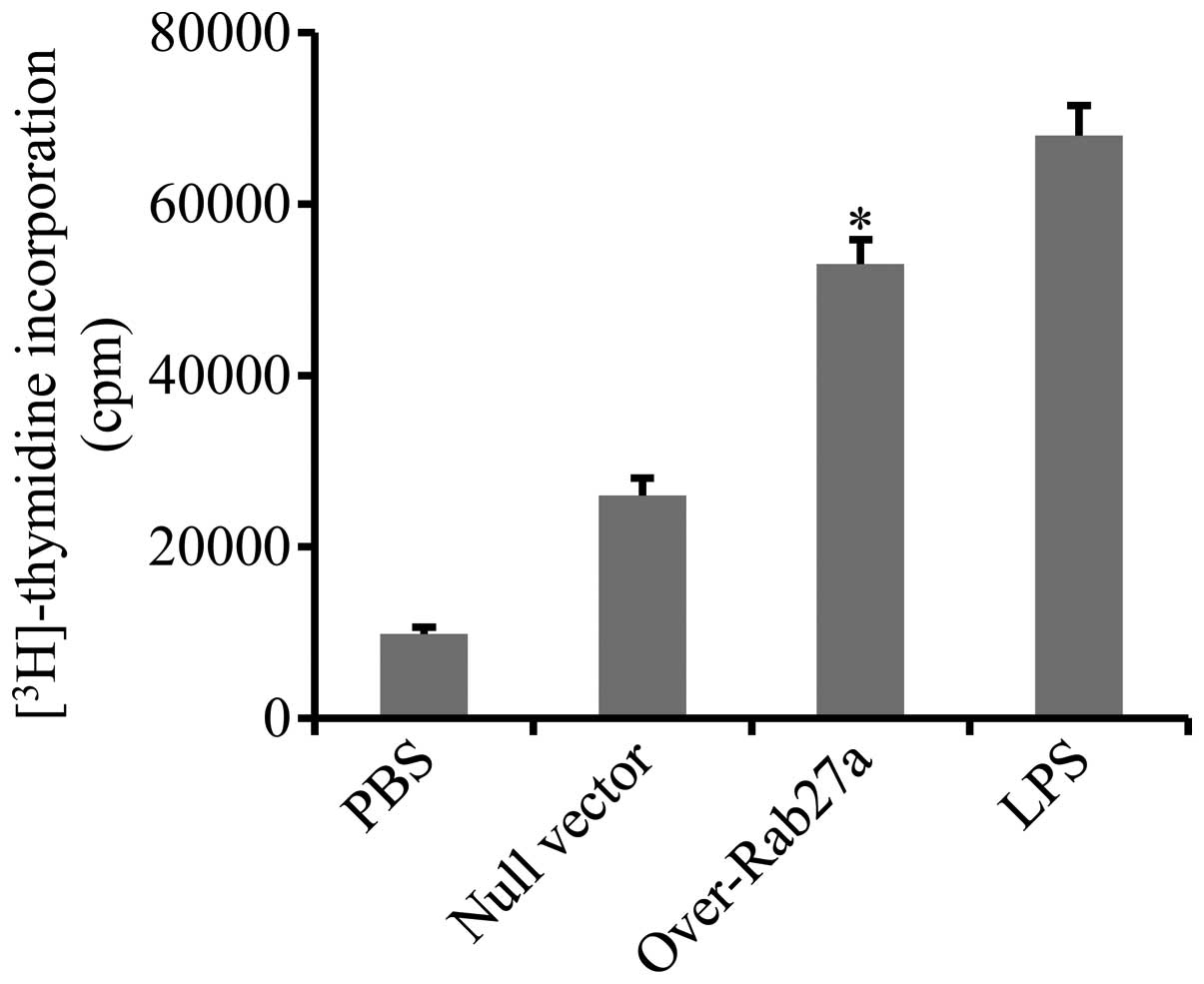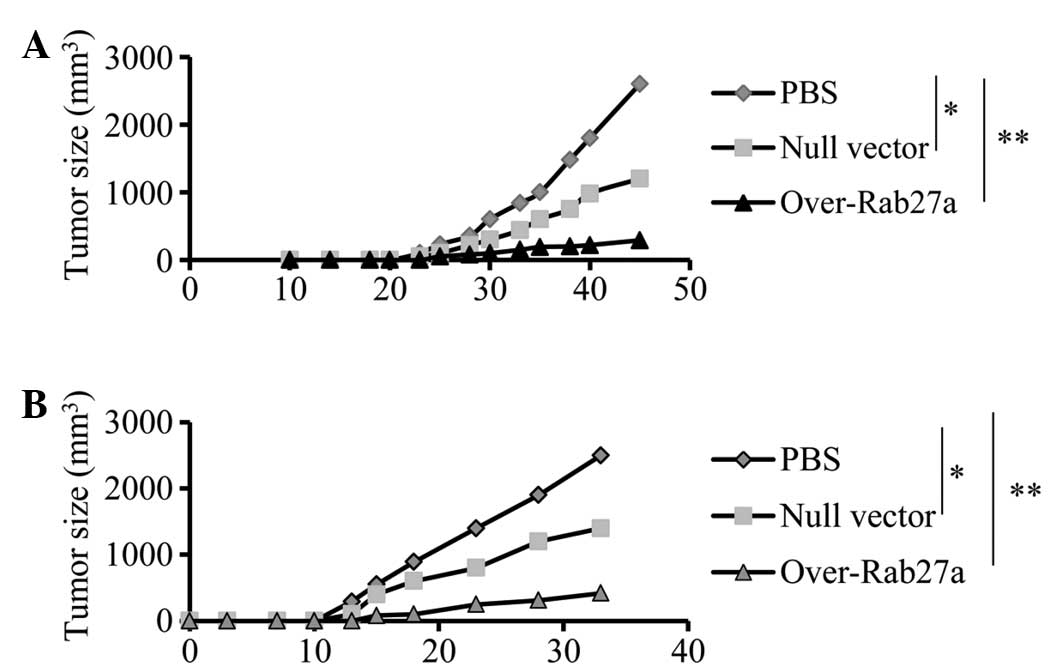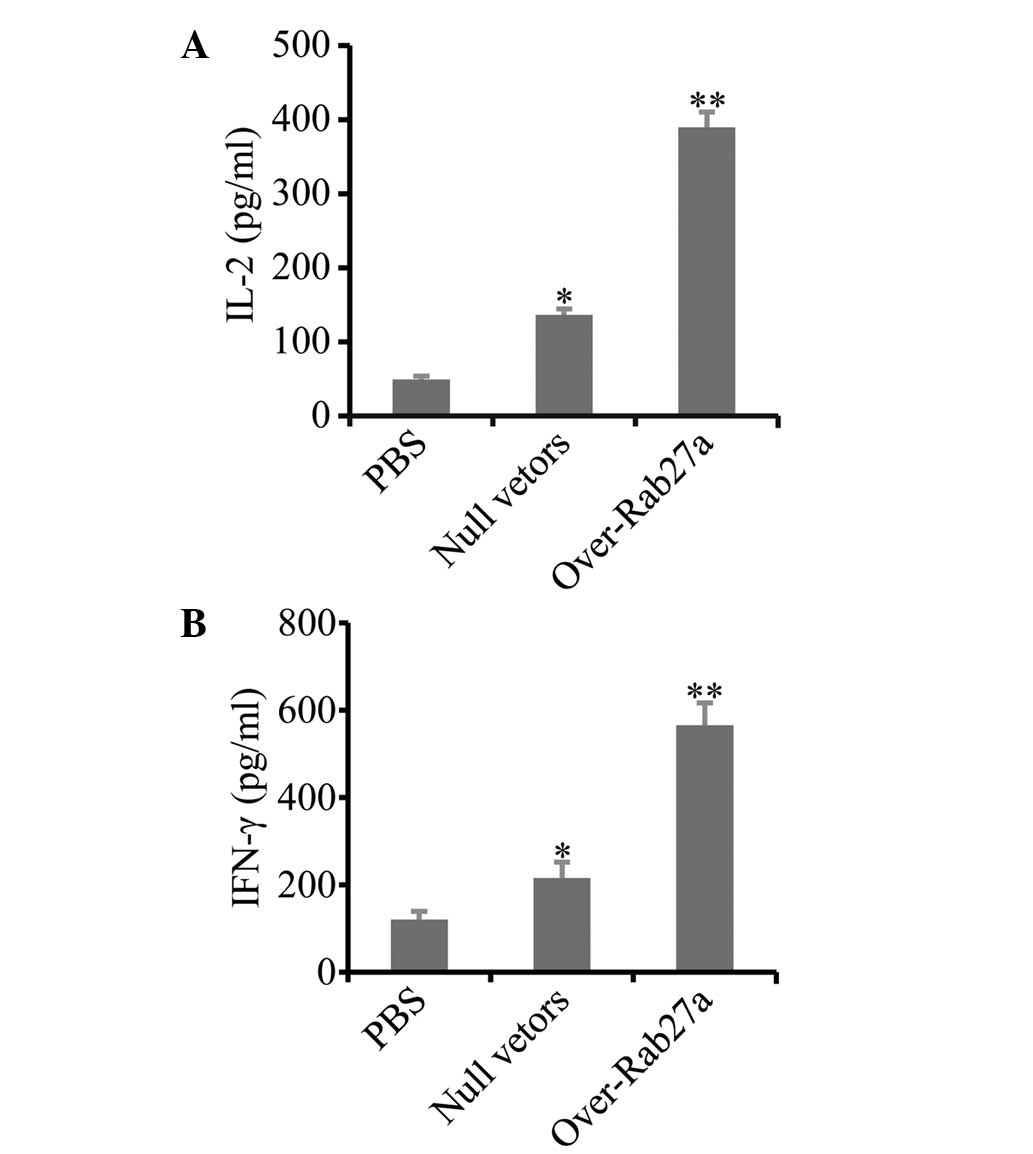|
1
|
Jemal A, Siegel R, Ward E, et al: Cancer
statistics, 2007. CA Cancer J Clin. 57:43–66. 2007. View Article : Google Scholar
|
|
2
|
Schiller JH, Harrington D, Belani CP, et
al: Comparison of four chemotherapy regimens for advanced
non-small-cell lung cancer. N Engl J Med. 346:92–98. 2002.
View Article : Google Scholar
|
|
3
|
Thomas L: On immunosurveillance in human
cancer. Yale J Biol Med. 55:329–333. 1982.PubMed/NCBI
|
|
4
|
Kaplan DH, Shankaran V, Dighe AS, et al:
Demonstration of an interferon gamma-dependent tumor surveillance
system in immunocompetent mice. Proc Natl Acad Sci USA.
95:7556–7561. 1998. View Article : Google Scholar : PubMed/NCBI
|
|
5
|
Shankaran V, Ikeda H, Bruce AT, et al:
IFNgamma and lymphocytes prevent primary tumour development and
shape tumour immunogenicity. Nature. 410:1107–1111. 2001.
View Article : Google Scholar : PubMed/NCBI
|
|
6
|
Wolfers J, Lozier A, Raposo G, et al:
Tumor-derived exosomes are a source of shared tumor rejection
antigens for CTL cross-priming. Nat Med. 7:297–303. 2001.PubMed/NCBI
|
|
7
|
Navabi H, Croston D, Hobot J, et al:
Preparation of human ovarian cancer ascites-derived exosomes for a
clinical trial. Blood Cells Mol Dis. 35:149–152. 2005. View Article : Google Scholar : PubMed/NCBI
|
|
8
|
Pan BT and Johnstone RM: Fate of the
transferrin receptor during maturation of sheep reticulocytes in
vitro: selective externalization of the receptor. Cell. 33:967–978.
1983. View Article : Google Scholar : PubMed/NCBI
|
|
9
|
Harding C, Heuser J and Stahl P:
Receptor-mediated endocytosis of transferrin and recycling of the
transferrin receptor in rat reticulocytes. J Cell Biol. 97:329–339.
1983. View Article : Google Scholar : PubMed/NCBI
|
|
10
|
Pan BT, Teng K, Wu C, Adam M and Johnstone
RM: Electron microscopic evidence for externalization of the
transferrin receptor in vesicular form in sheep reticulocytes. J
Cell Biol. 101:942–948. 1985. View Article : Google Scholar : PubMed/NCBI
|
|
11
|
Yang C and Robbins PD: The roles of
tumor-derived exosomes in cancer pathogenesis. Clin Dev Immunol.
2011:8428492011. View Article : Google Scholar : PubMed/NCBI
|
|
12
|
Stoorvogel W, Kleijmeer MJ, Geuze HJ and
Raposo G: The biogenesis and functions of exosomes. Traffic.
3:321–330. 2002. View Article : Google Scholar : PubMed/NCBI
|
|
13
|
Mignot G, Roux S, Thery C, Ségura E and
Zitvogel L: Prospects for exosomes in immunotherapy of cancer. J
Cell Mol Med. 10:376–388. 2006. View Article : Google Scholar : PubMed/NCBI
|
|
14
|
Valadi H, Ekström K, Bossios A, et al:
Exosome-mediated transfer of mRNAs and microRNAs is a novel
mechanism of genetic exchange between cells. Nat Cell Biol.
9:654–659. 2007. View
Article : Google Scholar : PubMed/NCBI
|
|
15
|
Subra C, Laulagnier K, Perret B and Record
M: Exosome lipidomics unravels lipid sorting at the level of
multivesicular bodies. Biochimie. 89:205–212. 2007. View Article : Google Scholar : PubMed/NCBI
|
|
16
|
Ratajczak J, Wysoczynski M, Hayek F,
Janowska-Wieczorek A and Ratajczak MZ: Membrane-derived
microvesicles: important and underappreciated mediators of
cell-to-cell communication. Leukemia. 20:1487–1495. 2006.
View Article : Google Scholar : PubMed/NCBI
|
|
17
|
Zitvogel L, Regnault A, Lozier A, et al:
Eradication of established murine tumors using a novel cell-free
vaccine: dendritic cell-derived exosomes. Nat Med. 4:594–600. 1998.
View Article : Google Scholar : PubMed/NCBI
|
|
18
|
Raposo G, Nijman HW, Stoorvogel W, et al:
B lymphocytes secrete antigen-presenting vesicles. J Exp Med.
183:1161–1172. 1996. View Article : Google Scholar : PubMed/NCBI
|
|
19
|
Ostrowski M, Carmo NB, Krumeich S, et al:
Rab27a and Rab27b control different steps of the exosome secretion
pathway. Nat Cell Biol. 12:19–30, sup pp. 11–13. 2010. View Article : Google Scholar : PubMed/NCBI
|
|
20
|
Zerial M and McBride H: Rab proteins as
membrane organizers. Nat Rev Mol Cell Biol. 2:107–117. 2001.
View Article : Google Scholar : PubMed/NCBI
|
|
21
|
Johnson JL, Brzezinska AA, Tolmachova T,
et al: Rab27a and Rab27b regulate neutrophil azurophilic granule
exocytosis and NADPH oxidase activity by independent mechanisms.
Traffic. 11:533–547. 2010. View Article : Google Scholar : PubMed/NCBI
|
|
22
|
Griscelli C, Durandy A, Guy-Grand D, et
al: A syndrome associating partial albinism and immunodeficiency.
Am J Med. 65:691–702. 1978. View Article : Google Scholar : PubMed/NCBI
|
|
23
|
Klein C, Philippe N, Le Deist F, et al:
Partial albinism with immunodeficiency (Griscelli syndrome). J
Pediatr. 125:886–895. 1994. View Article : Google Scholar : PubMed/NCBI
|
|
24
|
Munafó DB, Johnson JL, Ellis BA, et al:
Rab27a is a key component of the secretory machinery of azurophilic
granules in granulocytes. Biochem J. 402:229–239. 2007.PubMed/NCBI
|
|
25
|
Guo J, Wang B, Zhang M, et al:
Macrophage-derived chemokine gene transfer results in tumor
regression in murine lung carcinoma model through efficient
induction of antitumor immunity. Gene Ther. 9:793–803. 2002.
View Article : Google Scholar
|
|
26
|
Chaput N, Taïeb J, Schartz NE, et al:
Exosome-based immunotherapy. Cancer Immunol Immunother. 53:234–239.
2004. View Article : Google Scholar
|
|
27
|
Chen W, Wang J, Shao C, et al: Efficient
induction of antitumor T cell immunity by exosomes derived from
heat-shocked lymphoma cells. Eur J Immunol. 36:1598–1607. 2006.
View Article : Google Scholar : PubMed/NCBI
|
|
28
|
Lv LH, Wan YL, Lin Y, et al: Anticancer
drugs cause release of exosomes with heat shock proteins from human
hepatocellular carcinoma cells that elicit effective natural killer
cell antitumor responses in vitro. J Biol Chem. 287:15874–15885.
2012. View Article : Google Scholar
|
|
29
|
Desnos C, Schonn JS, Huet S, et al: Rab27A
and its effector MyRIP link secretory granules to F-actin and
control their motion towards release sites. J Cell Biol.
163:559–570. 2003. View Article : Google Scholar : PubMed/NCBI
|
|
30
|
Stinchcombe JC, Barral DC, Mules EH, et
al: Rab27a is required for regulated secretion in cytotoxic T
lymphocytes. J Cell Biol. 152:825–834. 2001. View Article : Google Scholar : PubMed/NCBI
|
|
31
|
Barral DC, Ramalho JS, Anders R, et al:
Functional redundancy of Rab27 proteins and the pathogenesis of
Griscelli syndrome. J Clin Invest. 110:247–257. 2002. View Article : Google Scholar : PubMed/NCBI
|
|
32
|
Bobrie A, Krumeich S, Reyal F, et al:
Rab27a supports exosome-dependent and -independent mechanisms that
modify the tumor microenvironment and can promote tumor
progression. Cancer Res. 72:4920–4930. 2012. View Article : Google Scholar : PubMed/NCBI
|
|
33
|
Peinado H, Alečković M, Lavotshkin S, et
al: Melanoma exosomes educate bone marrow progenitor cells toward a
pro-metastatic phenotype through MET. Nat Med. 18:883–891. 2012.
View Article : Google Scholar : PubMed/NCBI
|
|
34
|
Cho BK, Palliser D, Guillen E, et al: A
proposed mechanism for the induction of cytotoxic T lymphocyte
production by heat shock fusion proteins. Immunity. 12:263–272.
2000. View Article : Google Scholar : PubMed/NCBI
|
|
35
|
Fowler DW, Copier J, Wilson N, Dalgleish
AG and Bodman-Smith MD: Mycobacteria activate γδ T-cell anti-tumour
responses via cytokines from type 1 myeloid dendritic cells: a
mechanism of action for cancer immunotherapy. Cancer Immunol
Immunother. 61:535–547. 2012.
|
|
36
|
Tan A, De La Peña H and Seifalian AM: The
application of exosomes as a nanoscale cancer vaccine. Int J
Nanomedicine. 5:889–900. 2010.PubMed/NCBI
|
|
37
|
Morse MA, Garst J, Osada T, et al: A phase
I study of dexosome immunotherapy in patients with advanced
non-small cell lung cancer. J Transl Med. 3:92005. View Article : Google Scholar : PubMed/NCBI
|
|
38
|
Dai S, Wei D, Wu Z, et al: Phase I
clinical trial of autologous ascites-derived exosomes combined with
GM-CSF for colorectal cancer. Mol Ther. 16:782–790. 2008.
View Article : Google Scholar : PubMed/NCBI
|
|
39
|
Guo F, Chang CK, Fan HH, et al:
Anti-tumour effects of exosomes in combination with
cyclophosphamide and polyinosinic-polycytidylic acid. J Int Med
Res. 36:1342–1353. 2008. View Article : Google Scholar : PubMed/NCBI
|
|
40
|
Hao S, Ye Z, Yang J, Bai O and Xiang J:
Intradermal vaccination of dendritic cell-derived exosomes is
superior to a subcutaneous one in the induction of antitumor
immunity. Cancer Biother Radiopharm. 21:146–154. 2006. View Article : Google Scholar : PubMed/NCBI
|
|
41
|
Hao S, Bai O, Yuan J, Qureshi M and Xiang
J: Dendritic cell-derived exosomes stimulate stronger CD8+ CTL
responses and antitumor immunity than tumor cell-derived exosomes.
Cell Mol Immunol. 3:205–211. 2006.
|















